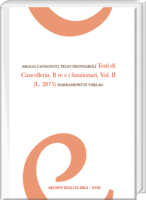|
|
more titles of the subject:
Download:
Please note: With adding digital Products to your cart
the payment will be handled via PayPal. The download will be provided after the payment is confirmed. This volume concludes the publication of the chancery documents found in the Royal Palace G of Ebla. The texts have been found (with the exception of no. 21) in L.2875 together with other tablets of different typology, all to be dated to the very last period of Ebla. The chancery texts published in the previous volumes ‒ ARET XIII (Rome, 2003) and ARET XVI (Rome, 2010) ‒ were instead kept in the Central Archive L.2769, whereas L.2875 is the small vestibule south of the main Archive Room.
Texts 1–20 are letters. Text 1, written by king Yiṯġar-Damu, relates events, connected with a treaty with the city of Armi, to be dated approximately two years before the fall of Ebla. Text 2 was addressed by the king and Ṭubuḫ-Hadda (a son of the minister who played an important role in the administration) to the vizier Yibbiʾ-Ḏikir. Several other letters were sent to the king by Yibbiʾ-Ḏikir, when the vizier was far from Ebla. Text 7 includes regulations of cult obligations, specifying the procedures for oracular interrogation. Text 21, from L.2769, is a very peculiar document, reconstructed from 25 fragments. It collects several legal procedures relating to the management of properties, to the journeys made by itinerant judges and superintendents of merchants, and to the fulfilment of obligations following the death of a man. The volume also includes an index complemented by the interpretations proposed for the Semitic spellings. |
|||||||||||||||||||||||||||||||||||||||






